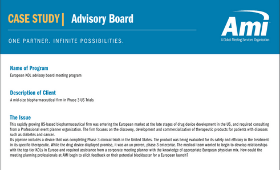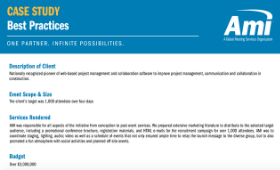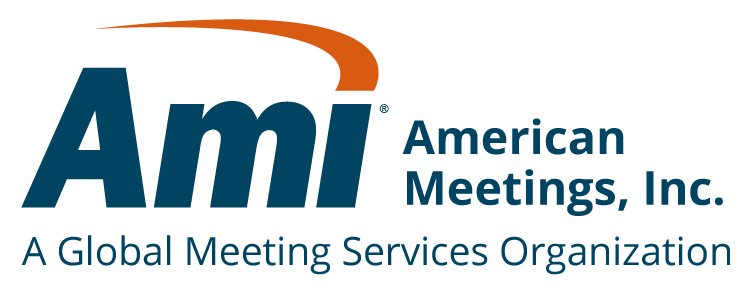
by levi_hb | May 13, 2020 | In-Person Meetings
There is no doubt the recent COVID-19 pandemic has changed the world. The future of commerce is still unknown as we begin to open back up while staying safe.
However, as life often demonstrates, there are also benefits that come out of the crisis as well. One of these is that negotiations with hotel properties hosting meetings and events will be stronger. Krystal Gonzales is the VP of Sourcing and Supply Chain Management for leading global meeting strategists, American Meetings, Inc. She recently pulled back the veil on what this really means to those looking to plan live events in the next year.
AMI Digest: Tell me a bit about how hotel negotiations happened before the COVID pandemic.
KG: Previously, the main goal when negotiating with a hotel or venue revolved around the rate, availability, and terms and conditions that represented a financial liability for the client. Those clauses were actively challenged by hotels. Prior to this pandemic, we were in a market where hotels had increased demand that allowed them to be more conservative with their negotiations. It gave them the power to call the shots. Now, the switch has been flipped and hotels are being forced to be much more aggressive with concessions and flexible in their negotiations.
AMI Digest: Kind of like the switch between a seller’s and buyer’s market in real estate?
KG: Exactly. It makes it even more important for clients, those who want to host an event, to use a third-party agency that is familiar with negotiation and changing laws to protect their rights when booking. My first tip is to use an agency like American Meetings, Inc. Globally, we’ve worked with all major hotel chains and independent hotels and have spent millions in revenue dollars. This allows us to leverage our relationships and buying power for better rates and terms for our clients.
AMI Digest: Have any clauses been updated or adjusted due to COVID?
KG: Absolutely. One of them being Force Majeure. It allows a client or venue to cancel a contract with no penalty, due to acts of god/natural disasters. This clause is now likely to include the outbreak of disease, quarantine restrictions, epidemic, etc. amongst other verbiage that now exists because of the pandemic. Several hotel brands have already implemented these changes as they understand the concerns that their clients and travelers feel as we navigate this pandemic. Including these specific terms as part of the fundamental negotiations will become standard practice
AMI Digest: What other clauses or terms should clients be aware of?
KG: Another tip is to ask for No Attrition. This clause allows for the client to block a certain number of rooms without being held financially liable for the ones that were not booked/used during their event/program. This is especially important during these times as we face more travel restrictions and new quarantine orders that can affect the event’s attendance.
AMI Digest: That makes a lot of sense. What else should we know?
KG: Well, another clause that is recommended, and was critical for all customers who canceled major events in the last (and next) few months is a Rebook Clause. This allows the client to cancel their event regardless of the reason. and utilize the cancellation fees towards a future event within a specific period of time. Cancellation fees will still be owed to the hotel, but will not be lost. Those funds are applied towards the future meeting as a deposit or final balance.
AMI Digest: How are cancellation fees calculated?
KG: It is calculated based on a percentage of the total dollar value of the event. Cancellation Clauses will have several tiers with each tier representing a time frame and a percentage. The closer in time that the event cancellation is given to the hotel, the higher the percentage and penalty. For example, if you have an event where the combined contract value of the guestrooms and food and beverage minimum is $100,000, canceling 6 months out could have a 50% cancellation fee. At one month out, it could be as high as 90-100%. That means clients would have to pay $50k-$100k at the time of cancellation in fees. Without a Rebooking Clause, that full amount is paid for and lost. With a rebook clause they can apply all or a percentage of that cancellation towards a future meeting.
AMI Digest: Wow, ok, yes, that is high!
KG: Third-party providers know the verbiage and what to look for in these clauses to make sure these fees are avoided or minimized. Now with our COVID experience, it is more important than ever to have an agency negotiate contracts. The extra experience and knowledge are really invaluable. In our industry, hotels, and agencies understand the importance of partnership and both will put forth their best efforts into achieving a favorable outcome for our clients.
AMI Digest: You also mentioned new clauses that could be beneficial to add to contracts. Can you say more about that?
KG: There are several clauses that have emerged to ensure that hotels are following local laws and regulations and protect the client if they fail to do so. With these clauses, hotels and their brands are showing their commitment to the safety of the guests. An example is the Gathering Laws. These relate to the hotel venue being fully aware of what is happening with local/national laws, social distancing restrictions, and being able to comply with those. If they can’t accommodate, or won’t, the client can cancel the agreement without penalty.
AMI Digest: It’s clear to see that this is directly related to this pandemic.
KG: Yes, and it has been wonderful to see the way hotel chains have proactively adapted to the new expectation of the guest’s experience as we live through a time that prioritizes sanitation and cleanliness over a buffet display.
AMI Digest: Time will tell just how and what will be changing in the face of global recovery, health, and safety. Thank you for sharing your knowledge with us today!
If you are looking for a third-party negotiator for your next multi-day event, whether ten participants or thousands, AMI is here to negotiate the best terms for your success!

by levi_hb | May 7, 2020 | Virtual Meetings
One thing that is sure in business is that change will happen. Neither good times nor bad times last forever. In the case of one of our clients in 2003, AMI had to pivot alongside them to make sure their 3-day Advisory Board meeting could continue. For the client, canceling would have meant a delay in bringing an FDA-backed product to market. Delaying would be a huge problem for the Fortune 100 pharmaceutical company.
Sixty high-level executives were making their way or had already checked into their New York City hotel when a major Northeastern US blackout occurred, with anticipated restoration several days out.
An immediate plan needed to be created to avoid losing the $250,000 event investment, plus the unknown yet significant costs associated with a delayed product launch.
AMI had been hired for full-service meeting management including travel coordination and had accounted for and anticipated the chance of an uncontrollable factor coming into play – after all, weather conditions could create a negative impact at any time.
Rather than been going into a downward spiral, AMI contacted venues, airlines, clients, and attendees to manage re-arrangement details. The Four Seasons in Philadelphia was able to accommodate the last-minute change and arranged for ground transportation for the attendees who had already checked in. Luggage was removed from the hotel rooms, even though they were primarily located on or above the 30th floor, without power, and sent with attendees to the new location.
Flights for inbound participants were changed to allow for their arrival in Philadelphia rather than their original NYC airports. Because all the contracts were created with Forc Majeure clauses, our clients were protected from financial penalties on the changes.
The event, while it started bumpy, ended with little further disruption, in an appropriate and comfortable space, allowing the clients to achieve their meeting objectives and meet their launch deadline.
Virtual Meeting Options for Emergencies
The above example demonstrates the ability to be agile in the face of an emergency and keep an event in person. In 2003, the technology doesn’t exist as it does today for large-scale virtual events and conferences. However, moving to a virtual conference in the midst of a power outage also wouldn’t be a viable solution.
That’s why working with professionals who know the industry is so critical.
The bottom line is that in the face of an emergency, meeting planners must have the experience to anticipate and accommodate changes quickly and easily. Most of this happens in the planning stages and is backed by expertise- an invaluable resource in knowing what to do and how.
If you need help with planning an event, whether in-person or virtual, with the backing of contingency plans to prevent the loss of time, money, and resources, contact AMI for more information and to get started.
For more information about Virtual Meetings, contact AMI
By e-mail: virtual@americanmeetings.com Or Call: 866-337-7799 ext. 8877

by levi_hb | Apr 30, 2020 | The American Meetings Network
In an instant, the COVID-19 crisis has turned the world’s concept of small and large in-person gatherings on its head. Virtual meetings, and webcasts/webinars have become a daily part of life. We are now starting to see several large expos and conferences announcing virtual (and hybrids of live/virtual) iterations of their previously scheduled live events.

AMI CEO, Andy McNeill.
What does all of this mean for meetings industry suppliers? We recently spoke with Andy McNeill, CEO of AMI, to get his take on the future of our industry and learn what MICE suppliers can do to position themselves for success when live meetings and events are able to come back on-line safely.
AMI DIGEST: Are we looking at a “new normal” for the meetings and events industry? Do you see any changes that you believe will be permanent?
AM: Live meetings will never be replaced completely. The opportunity to meet face to face (even if at a safe social distance) is something intrinsic to all industries. That said, AMI has seen a significant increase in clients who are transitioning their events to virtual engagements, and I believe this trend could potentially continue for the next 6-12 months.
AMI DIGEST: What do you feel will justify the return to traveling for meetings and events? What should industry suppliers do to help best support that?
AM: Government and businesses need to work together to open up the world in a safe and sustainable way. It helps no one to have this happen again. However, ultimately, it will be the perception of safety amongst all of us that will shape the reality as it relates to the general public being comfortable attending live conferences, meetings and events. Right now, some things that meetings industry suppliers can do, are provide safety gear, come up with innovative ideas for our clients and most importantly be prepared to adapt quickly to our client’s needs. Right now is also a great time to build your network of meeting planners, procurement professionals and sourcing directors, and perhaps look to become a thought leader to your sphere of influence. When this is all over you will be well-positioned when live events do come back on-line.
AMI DIGEST: Do you expect to see more organizers expanding their virtual event offerings, even for gatherings planned for far into the future?
AM: Yes, I believe event agencies will now always have a hybrid plan in place. They will plan for a certain percentage of attendees, who will not register for a live event, even after they are deemed safe to be held, and offer on-demand. This will allow attendees to access specific content and sessions remotely. We are seeing a significant expansion of the custom virtual environments being created for large conferences and expos. For the long term, this allows the agencies and clients to build larger audiences, and ultimately larger live programs down the road.
AMI: How might we use virtual events to increase engagement and better complement in-person events?
AM: As it relates to virtual engagements, if content is king, engagement is definitely queen. Utilizing polls, gamification, breakout rooms and secondary device polling and surveys are just a few examples of the tools we are seeing clients use for their virtual events. Sending thoughtful gifts ahead of time (we had a client send pajamas for everyone to wear on the call), or sending attendees gift cards for what would normally be an in-person gifting station, are just a few ways that AMI’s clients are handling virtual collaborative meetings and incentive travel programs that have had to be postponed.
AMI DIGEST: The Meetings industry has been hit hard in the past. What lessons have been learned from the past (9/11, SARS, EBOLA etc..) that can be applied to the COVID-19 pandemic?
AM: AMI was founded in 2002, on the heels of 9/11. We weathered the storms (literally) of the 2005 hurricane season (Katrina), and helped our clients navigate the watershed of cancellations, & postponements that were associated with the downturn in 2008. The experience and knowledge we have gained as an organization over the years, taught us to constantly innovate. We have the goal at AMI to have one new idea a week for our clients to weather this storm. Other suppliers should try it out. Imagine the wealth of ideas that would be generated? Finally, it’s important to always keep your eyes on the horizon, knowing “this too shall pass”. For our valued partner suppliers, while none of us know the exact timeline, our industry will return, I believe that when it does, it will come roaring back with a vengeance!
We hope to see everyone at ENGAGE! 2021. Please be safe out there.







